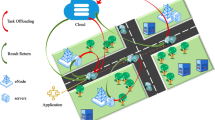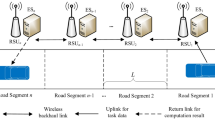Abstract
The sixth-generation (6G) vehicular networks are expected to be much more large-scaled, heterogeneous, dynamic and intelligent, and are expected to meet diverse Quality of Service (QoS) and Quality of Experience (QoE) requirements from vehicular applications. This paper aims to quantitatively investigate the capability of the MEC-Cloud orchestration paradigm in provisioning heterogeneous and priority 6G-V2X (Vehicle-to-Everything) service to vehicles. We develop a scalable analytic model for capturing the 6G V2X service process, in which a latency-sensitive vehicle task can dynamically migrate between MEC servers due to vehicle mobility. Formulas for calculating performance metrics, including task rejection probability and mean task response delay, are derived. Simulation results are combined with the numerical solution to demonstrate the approximate accuracy of the model and metric formulas. Numerical analysis is applied to illustrate the impact of various parameters on the 6G V2X service performance.













Similar content being viewed by others
References
Letaief KB, Chen W, Shi Y, Zhang J, Zhang YA (2020) The Roadmap to 6G: AI Empowered Wire-less Networks. In: IEEE Communications Magazine
Tang F, Kawamoto Y, Kato N, Liu J (2020) Future Intelligent and Secure Vehicular Network Toward 6G: Ma-chine-Learning Approaches. Proc IEEE 108(2):292–307
Strinati EC, Barbarossa S, Gonzalez-Jimenez JL, Cassiau DKN, Maret L, Dehos C (2019) 6G: The Next Frontier: From Holographic Messaging to Ar-tificial Intelligence Using Subterahertz and Visible Light Communication. In: IEEE Veh Technol Mag
Sun Y, Guo X, Song J, Zhou S, Jiang Z, Liu X, Niu Z (2019) Adaptive Learning-Based Task Offloading for Vehicular Edge Computing Systems. IEEE Trans Veh Technol 68(4):3061–3074
Yang Y, Chang X, Jia Z, Han Z, Han Z (2020) Processing in Memory Assisted MEC 3C Resource Allocation for Computation Offloading. In: The 20th International Conference on Algorithms and Architectures for Parallel Processing: 695–709
Kato N, Mao B, Tang F, Kawamoto Y, Liu J (2020) Ten Challenges in Advancing Machine Learning Technologies toward 6G. IEEE Wirel Commun 27(3):96–103
Moubayed A, Shami A, Heidari P, Larabi A, Brunner R (2021) Edge-enabled V2X Service Placement for Intelligent Transportation Systems. IEEE Trans Mob Comput 20(4):1380–1392
Kherraf N, Alameddine HA, Sharafeddine S, Assi CM, Ghrayeb A (2019) Optimized Provisioning of Edge Computing Resources With Heterogeneous Workload in IoT Networks. IEEE Trans Netw Serv Manag 16(2):459–474
Zhang S, Liu J, Guo H, Qi M, Kato N (2020) Envisioning Device-to-Device Communications in 6G. IEEE Netw 34(3):86–91
Chang X, Xia R, Muppala JK, Trivedi KS, Liu J (2018) Effective Modeling Approach for IaaS Data Center Performance Analysis under Heterogeneous Workload. IEEE Trans Cloud Comput 6(4):991–1003
Liu B, Chang X, Liu B, Chen Z (2017) Performance Analysis Model for Fog Services under Multiple Resource Types. DSA 2017:110–117
Dai H, Zeng X, Yu Z, Wang T (2019) A scheduling algorithm for autonomous driving tasks on mobile edge computing servers. J Syst Archit 94:14–23
Li L, Li Y, Hou R (2017) A Novel Mobile Edge Computing-Based Architecture for Future Cellular Vehicular Networks. WCNC 1–6
Fantacci R, Picano B (2020) Performance Analysis of a Delay Constrained Data Offloading Scheme in an Integrated Cloud-Fog-Edge Computing System. IEEE Trans Veh Technol 69(10):12004–12014
Jiang L, Chang X, Mišić JV, Mišić VB, Yang R (2021) Performance analysis of heterogeneous cloud-edge services: A modeling approach. Peer Peer Netw Appl 14(1):151–163
Zheng Z, Wang L, Zhu F, Liu L (2021) Potential technologies and applications based on deep learning in the 6G networks. Comput Electr Eng 95:107373
Kafhali SE, Salah K (2018) Performance analysis of multi-core VMs hosting cloud SaaS applications. Comput Stand Interfaces 55:126–135
Ghosh R, Longo F, Naik VK, Trivedi KS (2013) Modeling and performance analysis of large scale IaaS Clouds. Future Gener Comput Syst 29(5):1216–1234
Wu H, Wolter K (2018) Stochastic Analysis of Delayed Mobile Offloading in Heterogeneous Networks. IEEE Trans Mob Comput 17(2):461–474
Jiang L, Chang X, Yang R, Mišić JV, Mišić VB (2020) Model-Based Comparison of Cloud-Edge Computing Resource Allocation Policies. Comput J 63(10):1564–1583
Kafhali SE, Salah K (2017) Efficient and dynamic scaling of fog nodes for IoT devices. J Supercomput 73(12):5261–5284
Whaiduzzaman M, Naveed A, Gani A (2018) MobiCoRE: Mobile Device Based Cloudlet Resource Enhancement for Optimal Task Response. IEEE Trans Serv Comput 11(1):144–154
Chang X, Shi Y, Zhang Z, Xu Z, Trivedi K (2020) Job Completion Time under Migration-based Dynamic Platform Technique. IEEE Trans Serv Comput
Chen L, Zhou S, Xu J (2018) Computation Peer Offloading for Energy-Constrained Mobile Edge Computing in Small-Cell Networks. IEEE ACM Trans Netw 26(4):1619–1632
Tran TX, Pompili D (2019) Joint Task Offloading and Resource Allocation for Multi-Server Mobile-Edge Computing Networks. IEEE Trans Veh Technol 68(1):856–868
Zhang W, Zhang Z, Zeadally S, Chao H, Leung VCM (2020) Energy-efficient Workload Allocation and Computation Resource Configuration in Distributed Cloud/Edge Computing Systems With Stochastic Workloads. IEEE J Sel Areas Commun 38(6):1118–1132
Zhang K, Mao Y, Leng S, He Y, Zhang Y (2017) Mobile-edge computing for vehicular networks: A promising network paradigm with predictive offloading. IEEE Veh Technol Mag 12(2):36–44
Xiao Z, Dai X, Jiang H, Wang D, Chen H, Yang L, Zeng F (2020) Vehicular Task Offloading via Heat-Aware MEC Cooperation Using Game-Theoretic Method. IEEE Internet Things J 7(3):2038–2052
Neto JLD, Yu S, Macedo DF, Nogueira JMS, Langer R, Secci S (2018) ULOOF: A User Level Online Offloading Framework for Mobile Edge Computing. IEEE Trans Mob Comput 17(11):2660–2674
Cui T, Hu Y, Shen B, Chen Q (2019) Task Offloading Based on Lyapunov Optimization for MEC-Assisted Vehicular Platooning Networks. Sensors 19(22):4974
Huang M, Liu W, Wang T, Liu A, Zhang S (2020) A Cloud-MEC Collaborative Task Offloading Scheme With Service Orchestration. IEEE Internet Things J 7(7):5792–5805
Saeik F, Avgeris M, Spatharakis D, Santi N, Dechouniotis D, Violos J, Leivadeas A, Athanasopoulos N, Mitton N, Papavassiliou S (2021) Task offloading in Edge and Cloud Computing: A survey on mathematical, artificial intelligence and control theory solutions. Comput Networks 195:108177
Yıldırım MS, Aydın MM, Gökkuş Ü (2020) Simulation optimization of the berth allocation in a container terminal with flexible vessel priority management. Marit Policy Manag 47(6):833–848
Maplesoft (2021) Maple. http://www.maplesoft.com/products/maple
Erman J, Gerber A, Hajiaghayi MT, Pei D, Sen S, Spatscheck O (2011) To Cache or Not to Cache: The 3G Case. IEEE Internet Comput 15(2):27–34
Tran TX, Hajisami A, Pandey P, Pompili D (2017) Collaborative Mobile Edge Computing in 5G Networks: New Paradigms, Scenarios, and Challenges. IEEE Commun Mag 55(4):54–61
Rejiba Z, Masip-Bruin X, Marín-Tordera E (2019) A Survey on Mobility-Induced Service Migration in the Fog, Edge, and Related Computing Paradigms. ACM Comput Surv 52(5):1–33
Acknowledgements
The work was supported in part by the Fundamental Research Funds for Central Universities under Grant 2020YJS041 and in part by the National Natural Science Foundation of China under Grant U1836105.
Author information
Authors and Affiliations
Corresponding author
Ethics declarations
Conflict of interest
The authors declare that they have no conflict of interest.
Additional information
Publisher's Note
Springer Nature remains neutral with regard to jurisdictional claims in published maps and institutional affiliations.
Supplementary Information
Below is the link to the electronic supplementary material.
Rights and permissions
About this article
Cite this article
Jiang, L., Chang, X., Mišić, J. et al. Understanding MEC empowered vehicle task offloading performance in 6G networks. Peer-to-Peer Netw. Appl. 15, 1090–1104 (2022). https://doi.org/10.1007/s12083-021-01285-1
Received:
Accepted:
Published:
Issue Date:
DOI: https://doi.org/10.1007/s12083-021-01285-1




